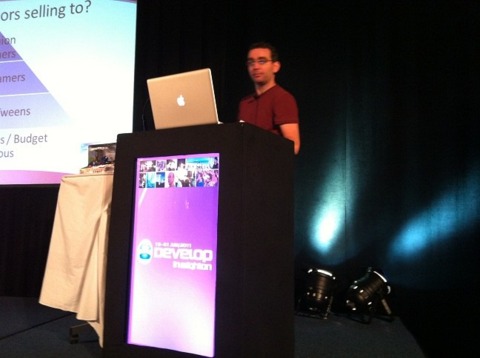Blur was 'confusing' for consumers, says design lead
Develop 2011: Former Bizarre developer Gareth Wilson, now at Sumo Digital, shares what he learned from the racer's commercial failure.
Who was there: Gareth Wilson was the design lead on Bizarre Creations' arcade racer Blur. The game earned unanimous praise in prerelease focus testing, scored well with reviewers, and had a large marketing spend, but it failed to sell enough copies to break even. Publisher Activision shut the studio down earlier this year, and Wilson has now moved on to work at Sumo Digital.

What they said: As the developer of Metropolis Street Racer and Project Gotham Racing, Bizarre Creations had extensive experience in the racing genre. It had also created launch titles for Sega and Microsoft consoles. However, when it was bought by megapublisher Activision, it released two commercial flops in the form of Blur and James Bond 007: Blood Stone, and the studio was closed shortly after.
Gareth Wilson, who was a designer on Blur, studied economics and business and used his learnings to reflect not just on the failure of Blur, but on game sales in general. New intellectual properties are having a tough time in the market, with Wilson citing Bulletstorm, Singularity, Alan Wake, Enslaved, and Vanquish as recent examples of good games that have struggled to gain traction at retail.
Wilson's first piece of advice to game makers was to reduce the competition. New intellectual properties could find audiences more easily by being a launch title for the Wii U or a release on smaller, cheaper platforms (mobile), or by going out via new distribution methods (OnLive). Wilson cited MotorStorm as a good example; the PlayStation 3 launch title gained immediate sales thanks to a limited number of options at launch, and the resulting profile helped it sell more copies over a prolonged time--much more than either of its two sequels, Wilson said.
His next recommendation was to think about an economic principle that he called "Consumer Theory 101," or reducing people's fear. Customers exist in three states--comfort, stretch, and panic--and during the purchase process, they make split-second decisions that push them between the three.
Wilson used three examples to illustrate his point. Cornflakes are a familiar, comfortable experience for most people. Chocolate cornflakes would be unique and would possibly stretch them into new ground. However, bacon cornflakes would be completely unique and would push consumers into an unfamiliar place that could yield panic.
The sweet spot for game makers is in the chocolate cornflakes area--where consumers are still in familiar territory, but where there are fewer competitors. Two examples he used were Batman: Arkham Asylum and Zumba Fitness. The former game would be considered niche, with the latter being mass-market, but both take familiar concepts and recognised brands and do something new with them.
A more personal example for Wilson was Sonic & Sega All-Stars Racing With Banjo-Kazooie, developed by his new employer, Sumo Digital. It was released earlier this year but was a lot more successful than Blur. Wilson said this was because it was familiar (kart racing), combined many different licenses (Sonic, Banjo-Kazooie), and had mass appeal (Sega characters resonate with core gamers and children alike). Blur, meanwhile, was an arcade racer with realistic cars, neon power-ups, and sci-fi weapons: a "confusing" prospect for potential buyers, he admitted.
Game developers who want to experiment should do so on lower-budget platforms, he advised. He explained how Limbo would never have gotten investment as a boxed product, but was the third biggest game on Xbox Live Arcade last year and made over £7 million ($11.3 million), coming from a team of around eight people. In other words, it was an immensely profitable game--and it hasn't even been released on the PlayStation 3 and PC yet. "If Playdead wants to make a triple-A game now, Microsoft will say, 'Sure!'" he claimed. He also praised Valve's approach to bundling the original Portal with familiar titles such as Half-Life 2. "If they did [Portal] as a $40 game, [consumers would] have been like, 'What is this?’"
Wilson said developers should aim to distill a game into a single statement and make sure all its design principles adhere to this statement. For Project Gotham Racing 3, the concept was "Being Cool in Cars." From that, the elevator pitch evolved into "Deliver the drama, exhilaration, and sex appeal of the world's most stylish vehicles and locations on the world's most powerful console." Following that were design pillars, such as "Life begins at 150mph." "If it doesn't fit in your pillars, you're damaging your game," he opined, claiming that PGR3 was the most tightly focused game Bizarre ever made.
Wilson's final option for developers was to build a reputation for excellence. Rockstar, Valve, and Crytek have all done this, and Wilson believes that games such as Red Dead Redemption, Left 4 Dead, and Crysis all managed to thrive in busy genres off the back of their developers' reputations. However, it takes money to do this and is a risky proposition, as developers are often considered only as good as their last game.
Quotes: "We're competing with everything. We're competing with having sex with your girlfriend. [Your game] has got to be better than going to the pub for two nights."--Wilson on the true extent of competition in the marketplace.
"If I released a sim racing game and an arcade racing game, the sim would score higher because that's what reviewers like."--Wilson, bemoaning the reviews process.
Takeaway: Making games is tougher than ever. "To be triple-A, you need to be [scoring] 9 out of 10," Wilson argued. He was clearly burned by his experience on Blur, unable to see why his game sold so poorly following such a positive reaction and a big marketing spend. However, on reflection, and by using economic principles to understand the market, he can now understand why other games thrived while his faltered.
Got a news tip or want to contact us directly? Email news@gamespot.com
Join the conversation